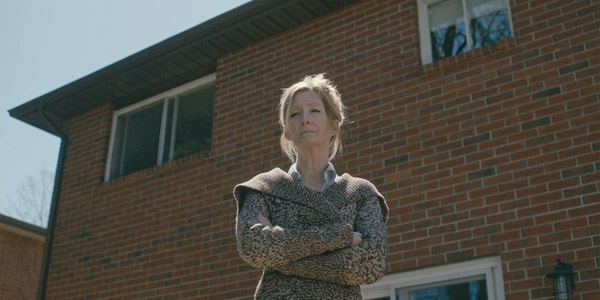In a 2009 interview for the website SBS Movies, actress Tilda Swinton recalled that when she was asked by a studio executive what type of movie she would like to make in Hollywood, she answered, something like Mildred Pierce, which she had just seen the night before. The result: The Deep End (2001). Well, actress Sheila McCarthy follows in Swinton’s, and Joan Crawford’s, footsteps with the noirish Cardinals from Canada, which premiered this week at the Toronto International Film Festival.
That’s not to say that the two contemporary films are in the same league as Michael Curtiz’s 1945 classic, but all three offer the lead actress a juicy and complex role of a mother who goes to questionable lengths to protect her child. The determination, and the contradictions, of the strong, but flawed, female protagonist push along the pulpy plots.
At its core, Cardinals is a straightforward revenge drama that intriguingly and subtly drops hints of what really happened when Valerie Walker (McCarthy) plowed her car into a neighbor, killing him. After serving seven years for involuntary manslaughter (she was found drunk at the crash), her two daughters, both in their early 20s, prepare for mom’s homecoming in a two-level home that has been stripped bare of paintings and furnishings, presumably to pay her legal fees. A raw egg splattering on a bedroom window is the first sign that Valerie may not be greeted with a welcome basket from the neighbors. On her first day of freedom, she appears not to fully take in her circumstances as a parolee. One of her first requests: “I’d kill for a glass of wine.”
The film really kicks into gear when Mark (Noah Reid), the now grown-up son of the crash victim, pays an unannounced visit the following morning, interrupting Valerie and her daughters’ breakfast. Here Valerie’s imperiousness and outward confidence are on full display; the only act of contrition she pays to the young man is to whip up some scrambled eggs. McCarthy’s performance adds considerable heft to the screenplay, portraying a smooth talker who has been covering her tracks most of her life and a sly manipulator. She takes her time before she responds, either out of thoughtfulness or, as Mark supposes, calculation.
Though the screenplay often lays down the exposition as heavily as a judge’s gavel, Valerie remains an enigma, spookily cool, calm, and collected, with a strong undercurrent of impatience, as Mark begins collecting clues that contradict her account of the incident. Valerie presents such a great cool exterior that when she offers an act of kindness, one is not sure if she is well-meaning or threatening. She meets her intractable match in the mother of a friend who suffered a debilitating stroke that left her speechless and wheelchair-bound, strapped to an oxygen mask. But this elderly woman knows Valerie’s number, and if looks could kill, the film would have a higher body count.
After 40 minutes, the audience has a complete grasp of the plot’s puzzle pieces, yet McCarthy’s performance makes the viewer feel as though anything could happen. Additionally, directors Grayson Moore and Aidan Shipley add layers to what could have been a family drama-turned-procedural. For example, Valerie’s parole officer, at first glance a milquetoast, is not as easily swayed as she first assumes.
However, when McCarthy isn’t on-screen, the film loses its assuredness. She and actress Catherine Fitch, who plays a friend and former coworker with a secret, base their performances on physicality and what lies beneath the text. In their scenes, words don’t matter. The same can’t be said of the younger actors, who come across as awkward, tentative, and casual. As a result, the tension in the concluding set piece flatlines.
McCarthy will be the main draw for festivalgoers. For Canadian audiences, she needs no introduction, as she has had a major career on stage (Stratford Festival), television (Little Mosque on the Prairie), and film. She first grabbed attention in the States with the 1987 art-house hit I’ve Heard the Mermaids Singing, which also introduced audiences to director Patricia Rozema.
The festival serves as the major showcase for the Canadian film industry, given that it’s the biggest media event in the country and the largest film festival in North America. Whether the viewer is Canadian or an out-of-towner, McCarthy’s work in Cardinals ranks among the top of the homegrown entries.
Cardinals will continue to screen at the Toronto International Film Festival.







Leave A Comment